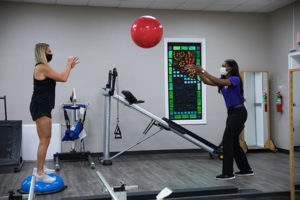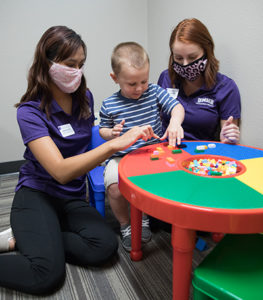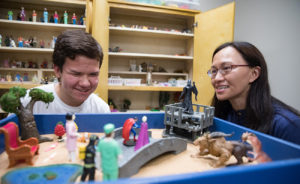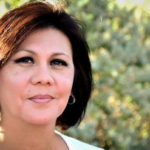Belton residents once walked through the doors of the church building on Pearl Street to feed their spiritual needs. Now, the landmark structure serves as a place where residents can get physical and occupational therapy, along with help for their mental health needs.
In 2019, work began to transform the building—once the site of a Church of the Nazarene and later the home of the University of Mary Hardin-Baylor Baptist Student Ministry—into the Cru Community Clinic.
The renovated space provides a setting where UMHB students who are studying physical therapy, occupational therapy and counseling gain hands-on training in an interprofessional environment.
Providing students clinical experience
Each of the three programs provides integrative free services to the community while giving students opportunities to work with actual patients.

“Clinic experience is priceless, and we are so blessed to have this opportunity for our students,” said Giulianne Krug, program director and professor for the new Master of Science in Occupational Therapy program at UMHB, which welcomed its first cohort last January.
“I have seen firsthand how bringing the book and classroom work to life in the clinic facilitates professional reasoning and evidence-based practice like nothing else. It prepares students for excellence as entry-level occupational therapists.”
Barbara Gresham, program director and professor of the Doctor of Physical Therapy program at UMHB, said before the clinic opened, they brought volunteers to the lab to act as “patients” and have simulated interactions with students.
“Now they can get real practice with real patients before they go into their clinical experiences,” Gresham said.
Working as a team
Ty Leonard, professor and director of the professional counseling program at UMHB, said the goal of opening a clinic with all three practices together is to provide students with integrative practical experiences so they can learn to work with different professions as a team when serving clients.
Sign up for our weekly edition and get all our headlines in your inbox on Thursdays

“We may have a client who is struggling with an injury, has chronic pain, has possibly lost the ability to work, and is having to start over,” he said. “That person would need physical therapy for the injury, occupational therapy to learn how to adapt and adjust to his or her new life, and counseling to deal with the emotional and mental issues that go along with that.
“If we work together as a team, we can more integratively serve the client in a way that provides continuous care.”
Renovations to the Cru Community Center turned the chapel space into a large, open occupational and physical therapy gym. Former office spaces were turned into private treatment rooms for occupational and physical therapy, as well as into counseling rooms. The counseling spaces include a group therapy room, a play therapy room for pediatric patients, an observation room and a sand therapy room with miniature figures that help trauma patients with counseling.
The new clinic also provides a fully functioning kitchen and laundry for training and retraining in home management skills. There’s also a hand therapy area for individuals who need occupational therapy after a hand or upper extremity injury, including physical agent modalities and splinting capability.
Occupational therapy students are also able to provide sensory-based therapy in the pediatric lab in Hardy Hall as part of the Cru Community Clinic.
“All of this is in addition to being able to provide the same high-quality occupational services that are available at most outpatient rehabilitation clinics,” Krug said.
Serving an underserved population
The spacious therapy gym also includes specialized equipment that typical physical and occupational therapy clinics use, including a treadmill, elliptical and weight machines, training stairs and a traction device.

(UMHB Photo / Blair Dupre)
Before the new clinic opened with all three disciplines, counseling services had been provided in a nearby building called the Community Life Counseling Center, which opened in 2005. Over the last 15 years, the center had become a primary support service for people in need of counseling, and the program had long outgrown its space in the old facility.
“There’s a large and underserved population of people who can’t afford therapy except through social services,” Leonard said, explaining that the Cru Community Clinic targets clients who are either uninsured, underinsured or have exhausted their insurance benefits.
“UMHB’s support of this new clinic has been phenomenal. They really believe in giving back to the community and living their Christian mission.”
Leonard, Krug and Gresham agree the new center has become a unique selling point for each of their programs. They are also enjoying working with each of the other programs to help fill the gaps for those clients who are unable to receive the full spectrum of therapy services.
“We are committed to providing the best education to our students and pouring into our community while providing that education, and this clinic allows us to do just that,” Krug said. “I am beyond excited to have this space and programming available, and we can’t wait to see more and more referrals come rolling in.”















We seek to connect God’s story and God’s people around the world. To learn more about God’s story, click here.
Send comments and feedback to Eric Black, our editor. For comments to be published, please specify “letter to the editor.” Maximum length for publication is 300 words.